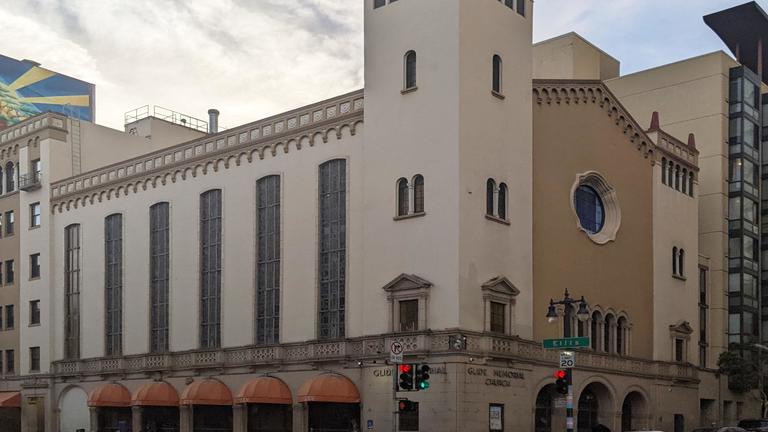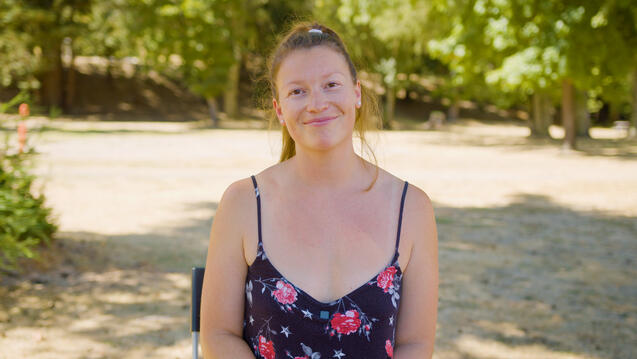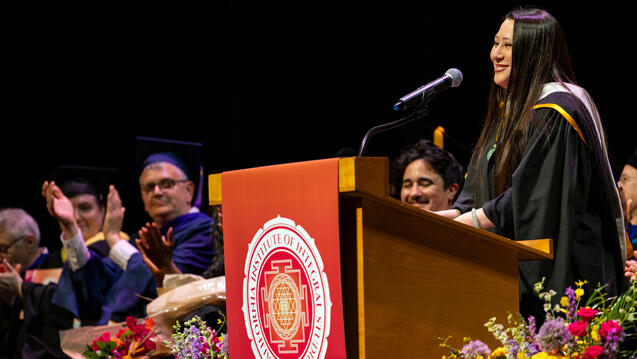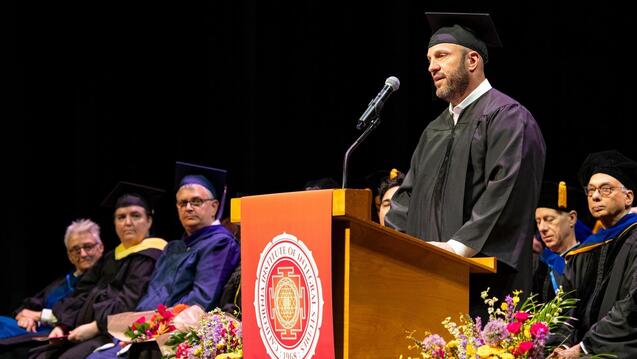Marine Corps veteran Bre Butler discovered a path to healing and transformation through CIIS' Integrative Health Studies program after five years of active duty service.

Together We Rise: Valuing Our GLIDE Partnership
Expressive Arts Therapy students offer weekly after-school programs for elementary school children
In classrooms in San Francisco and through our online learning programs, the CIIS community demonstrates a collective sense of urgency and responsibility to address issues that affect us and our neighbors, to, as Gandhi said, "be the change that you wish to see in the world."
But how? How can CIIS participate in local, regional, and global actions and lend our energy, time, talent, and resources in meaningful ways?
Expressive Arts and Community Non-Profits
One opportunity is university-community partnerships, in which CIIS programs join with the efforts of community-based nonprofits. For many years, the Expressive Arts Therapy M.A. program has had a remarkable, mutually beneficial relationship with GLIDE, where Expressive Arts Therapy students offer weekly after-school programs for elementary school children. This partnership has had a positive impact on everyone involved: CIIS students and faculty, GLIDE families, and GLIDE staff.
Beginning in 2010, faculty member Dr. Denise Boston and program chair Dr. Shoshana Simons began seeking a reciprocal relationship with a San Francisco-based community service agency, where talented, eager Expressive Arts Therapy students could learn and grow while doing immediate, tangible work. They turned their attention to GLIDE, a radically inclusive, just, and loving community mobilized to alleviate suffering and break the cycles of poverty and marginalization.
Both CIIS and GLIDE began in 1960s San Francisco in response to the dramatic social changes of the time. For 50 years, each organization has served as a vanguard of social transformation.
At first, Expressive Arts Therapy faculty members and students offered full-day art-making retreats for all levels of GLIDE's Youth and Childcare Center (FYCC) staff as a means of getting to know each other. The dramatic play, storytelling, improvisational music, and mural-making served to lay a foundation for an authentic, reciprocal, culturally appropriate, and trusting relationship for all involved.
Next, Expressive Arts Therapy students began to offer arts-based social-emotional learning (SEL) groups for children and teens once a week. The resulting "Playful Thursdays" program has offered GLIDE's second- through fifth-graders a weekly co-created, multidisciplinary arts studio.
Our overarching goal was to build a stable community partnership working with kids and families, many of whose lives have characterized by instability and inconsistency," says Dr. Simons.
"With FYCC, CIIS has established a long-term reciprocal relationship-a common thread of trust-where we have collectively been able to hold families over time. Eight years and 85 students later, I'd say we have been able to more than meet that goal."
Art-making, Therapy, and... Pizza
Over the years, GLIDE children have made murals, art journals, plays, short films, original arcade games, and themed play rooms filled with hand-made props, and they have invented new cooperative games and mindfulness activities. Each session ends with a celebration and pizza party. Throughout, GLIDE staff members have attended a weekly planning meeting at CIIS so that staff, students, and faculty can share their knowledge of the arts, child development, group facilitation, classroom management, family systems, and trauma-informed practice. Weekly programs continue this spring.
After two years of initial programming, Dr. Boston initiated and led a mixed-methods, longitudinal participatory research study that followed 14 first- and second-grade children over three years of regular participation in Expressive Arts Therapy Playful Thursdays.
GLIDE teaching staff members completed Behavioral and Emotional Rating Scale (BERS-2) to assess the children's behavioral and emotional strengths at baseline and two years later. Student facilitators completed weekly child assessments. GLIDE parents, program administrators, and Expressive Arts Therapy students also completed evaluations and contributed interviews.
Preparation for Diversity Work
The findings reveal benefits to everyone involved. Each year, participating children evolved as leaders, critical thinkers, and expressive artists. The GLIDE teaching staff developed a new set of SEL perspectives and techniques. Participating CIIS students not only practiced Expressive Arts Therapy applications but also critically reflected on their position as University representatives in the community. Our Expressive Arts Therapy master's program confidently prepares students to work in an increasingly diverse society.
In Fall 2017, Dr. Boston, who also serves as Director of CIIS Office of Diversity and Inclusion, along with me and Expressive Arts Therapy alumna Batya Ross ('12), published an article in the Journal of Community Engagement and Scholarship (JCES). JCES is a peer-reviewed international journal that integrates teaching, research, and community engagement in all disciplines, addressing critical problems identified through a community-participatory process.
The article, "Playful Thursday Project: Community/University Partners and Lessons Learned in a Longitudinal Study" and others in this volume find powerful evidence of the benefits of utilizing community-based coalitions and mutually beneficial collaborations to effect social change; the need to integrate interpersonal skills of relationship building, effective communication, and moral ways of being into scientific research; and the use of creative responses in participant feedback (e.g., stories, poems, photos, videos).
Related Academic Program
Master of Arts in Counseling Psychology with a Concentration in Expressive Arts Therapy
Related News
Integral Counseling Psychology M.A. graduate Marissa Huang gave one of two student speeches at CIIS’ 57th Commencement Ceremony.
B.S. in Psychology graduating student Dominic Bucci delivered one of two student reflections at CIIS’ 57th Commencement Ceremony.



